Introduction
Islam makes certain times and places especially sacred. While a believer can certainly engage in worship such as remembering or glorifying God at any time (“standing, sitting or lying on their sides)”some periods of time have special and unique blessings associated with them. Similarly, while the entirety of the Earth has been made a place of worship and prostration, there are some locations (such as the three Mosques) that are uniquely blessed. This creates within the psychology of the believer a yearning to seek out these unique opportunities in order to come closer to Allah. That yearning brings about several positive spiritual emotions: awe, reverence, wonder, anticipation, eagerness, excitement, hope, and longing, all of which are encompassed in the term shawq.
As we live today in an era of digital distractions and materialistic heedlessness, often acts of worship are squeezed into brief moments in our daily routine, which does not furnish one with a complete transformative spiritual experience. Serious worship requires not just taking a brief moment to pray, but allowing our prayers to define our direction in life. Thus, Islam offers opportunities for intense spiritual experiences, experiences that involve setting aside the dunya (worldly life) and its distractions. Of the greatest of such opportunities are the blessed nights of Ramadan. The Prophet Muhammad ﷺ said, “Whoever spends the nights of Ramadan in prayer out of faith and in the hope of reward, he will be forgiven his previous sins.”
The foremost of these opportunities are the last ten nights of Ramadan. As the Prophet’s wife `A’isha narrates, “When the last ten nights began Allah’s Messenger (peace be upon him) kept awake at night (for prayer and devotion), wakened his family, and prepared himself to observe salah (with more vigor).”
It is no coincidence that i`tikaf (seclusion in the masjid) is also recommended in Ramadan. The Prophet Muhammad ﷺ used to practice i`tikaf for the entirety of the last ten days of Ramadan.
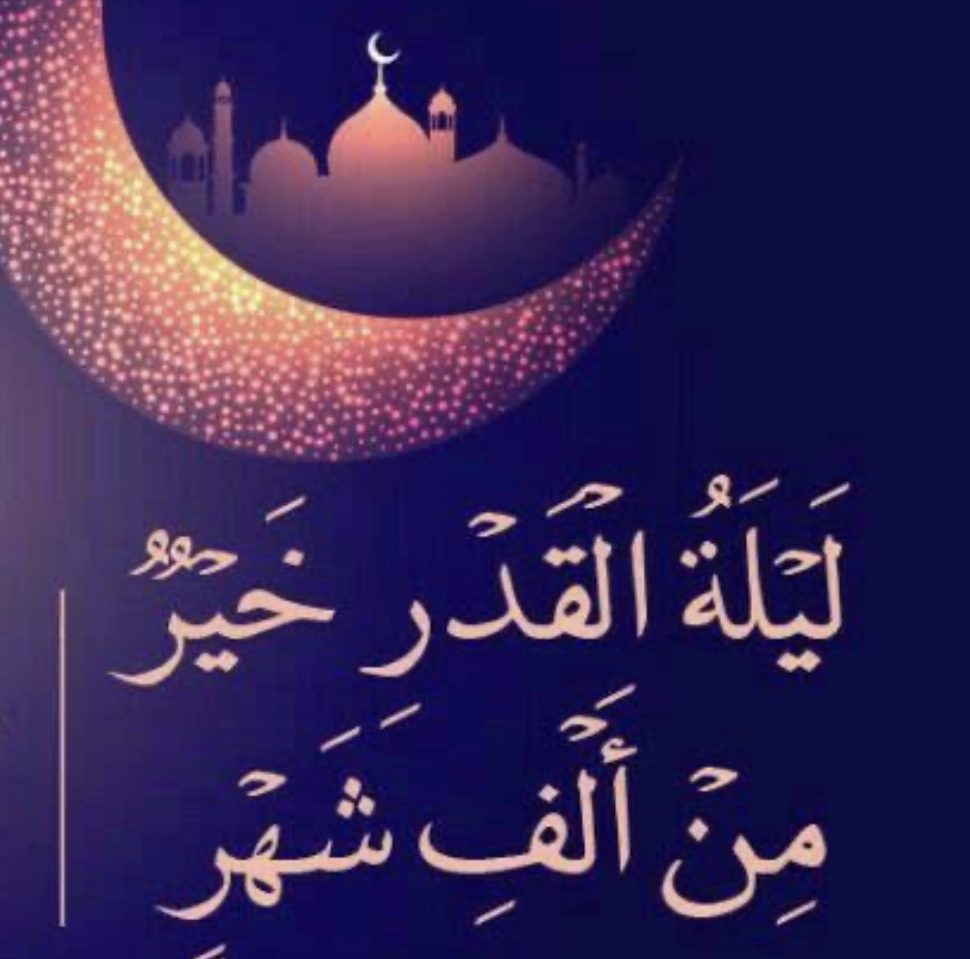
Lailat ul Qadr
Lailatul Qadr – the Night of Power or Decree is upon us as we welcome the last ten days of Ramadan. Let us learn about the significance of this beautiful night in which Allah has honored us with attaining the reward of one thousand months of blessings, and His Mercy. A night where Allah (swt) says:
“Verily, We have sent it (this Quran) down in the night of Decree. And what will make you know what the night of Decree is? The night of Decree is better than a thousand months (i.e. worshipping Allah in that night is better than worshipping Him a thousand months, i.e. 83 years and 4 months). Therein descend the angels and the Rûh, Jibril (Gabriel), by Allah’s Permission with all Decrees. (All that night), there is Peace (and Goodness from Allah to His believing slaves) until the appearance of dawn.” (Sura 97:Verse 1-5)
The mystery of Lailatul Qadr lies in not knowing the exact night that it occurs. We are given some indication that it is in the last ten days, specifically on one of the odd nights (21st, 23rd, 25th, 27th or 29th) of Ramadan. On the authority of Ubaadah ibn As-Saamit that the Messenger of Allah (saw) said:
“The night of Al-Qadr is to be found in the last ten (nights of Ramadan), whoever stood in prayer during these nights, wishing for the reward of them will have his sins forgiven by Allah, both the earlier and the later; and it is the night of witr (an uneven number). Nine, seven, five, three or the last night of it.” (Narrated by Imaam Ahmad).
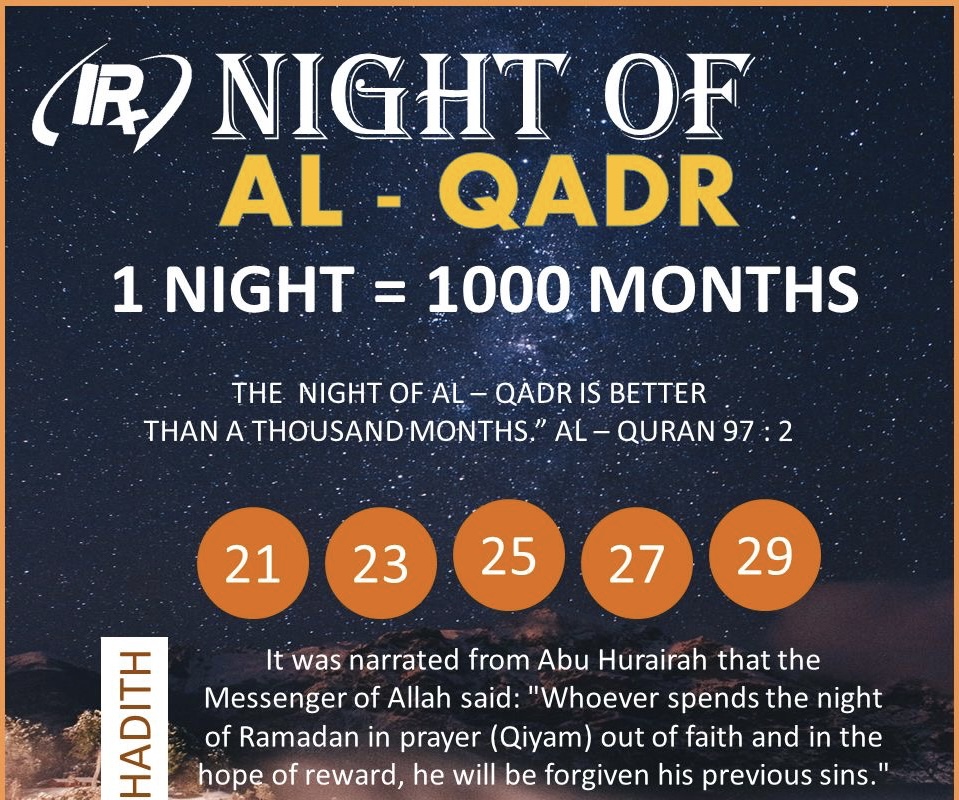
Sura Al-Qadr in the Quran, relates to us that the Night of Power is better than a thousand months which indicates its true grandeur. Allah (swt) has honored us with a way to attain many blessings by the righteous deeds that are performed on this night. Some of us may not even live that long to worship Him.
It could be considered as a Mercy from Allah, for us to gain the Ibadah equivalent to the people from another time, who used to have much longer life spans. Another blessing about this night, is that whoever performs qiyaam ul layl (night supplications) with true faith and while seeking reward in it, will have his past sins forgiven.
It is recommended to increase one’s supplications during the whole month of Ramadan, but more in the last ten days, and even more on the odd nights. If there is an indication of Al Qadr, we should make special supplication to Allah. Aisha (ra) asked the Prophet (saw):
“What if I know on which night the night of Al-Qadr occurs, what should I say?” So he (SAW) said: “Say: Allahumma innaka `Afuwwun, tuhibbul `afwa, fa`fu `annee (O Allah, indeed you are All-Pardoning. You love forgiveness, so forgive me).” (Reported by At-Tirmidhee and Ibn Maajah).
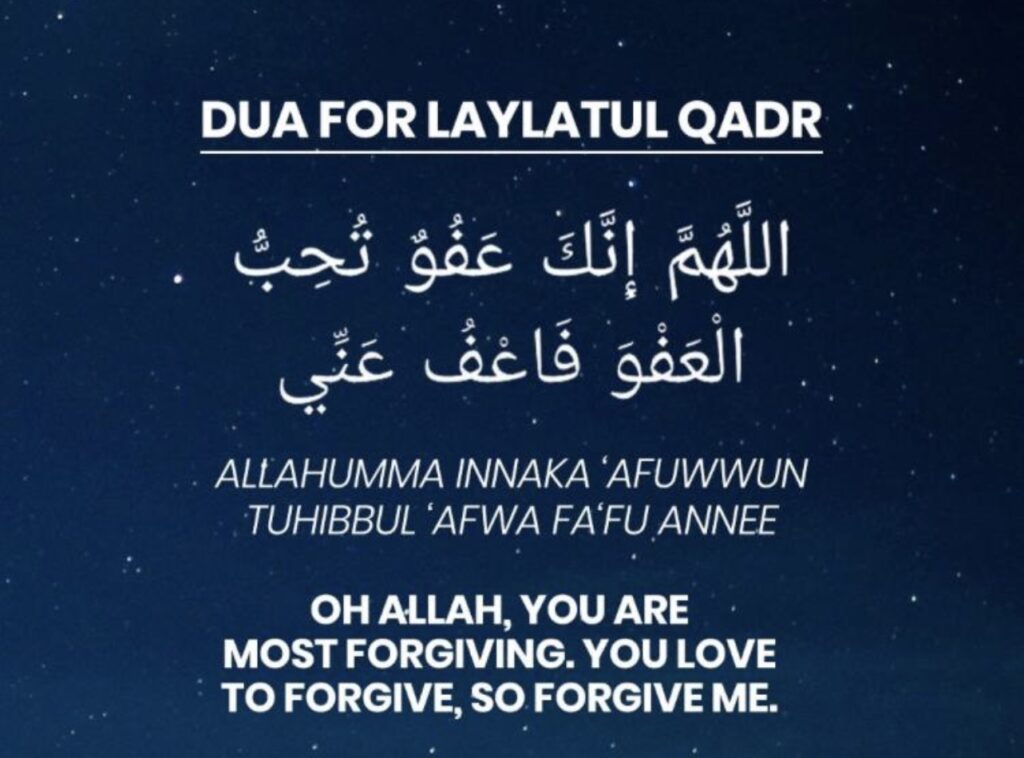
Abu Hurairah RA reported that the Messenger of Allah (SAW) said:
“Whosoever performs the night prayer on the night of Al-Qadr with Eemaan (firm belief) and seeking reward will have all his past sins forgiven.” (Bukhari 4:2550 and Muslim 759).
Subhanallah! We definitely do not want to miss out on these vast amount of blessings, so we should try our hardest to leave our worldly affairs alone, and to turn our heart and mind in only the remembrance of Allah (SWT).
The Revelation of Al-Quran
“Ha. Mim. By the book that makes things clear. We sent it down during a blessed night. For We (ever) wish to warn (against evil). In that (night) is made distinct every affair of wisdom, by command, from Our Presence. For We (ever) send (revelations), as a mercy from Thy Lord: for He hears and knows (all things).” (44:1-6)
On this special night of Al-Qadr, the Quran was revealed. The Quran was revealed in parts to the Prophet (saw) according to events which took place during his life over a period of 23 years.
“(It is) a Qur’an which We have divided (into parts from time to time), in order that thou mightiest recite it to men at intervals. We have revealed it by stages.” (Sura 17: Verse 106).
The Descent of the Angels
“That is, innumerable angels descend with uncounted blessings and mercy, as they descend when the Quran is recited and they surround those sitting in circles in remembrance of Allah and they lower their wings in the presence of the sincere seeker of knowledge in honour of him. As for the Spirit, it has been said that what is meant by it is the angel Jibreel (AS) is mentioned thus to distinguish him from the other angels. (Tafseer of Surah An-Naba’, verse 38).
Angels descend on lailatul Qadr, and send their salutations of peace upon those who are occupied in prayer until dawn. Sa’eed ibn Mansoor narrates, on the authority of Mujaahid, that the night is safe from the machinations of the devils, that they cannot commit evil or harm on it. Others said that the Divine Decrees are issued at that night, the appointed time of everything is fixed and the blessings are apportioned.
Signs of Lailatul Qadr
It is said that the sun rises early in the morning without rays, rain may fall either during the night or during the day of that night. On that night, the sky will be slightly foggy and lit without reflections and rays from the moon, and the night will be neither too hot nor too cold. Narrated on the authority of Ibn Abbaas (RA) that Allah’s Messenger (saw) said:
“It is a night of magnanimity and joy, neither very hot, nor very cold; and the sun of the morning following it is weak and red-coloured.” (Narrated by Abu Dawood At-Tayaalisi).
It is reported on the authority of Jaabir ibn Abdillaah, that the Messenger (saw) said,
“Verily, I saw the night of Al-Qadr and then I was made to forget it, but it is (to be looked for) in the last ten nights, the night is clear and fine, neither hot nor cold as if there were a full moon and on this night, the devils do not go forth until the light of dawn.” (Narrated by Ibn Abi Haatim).
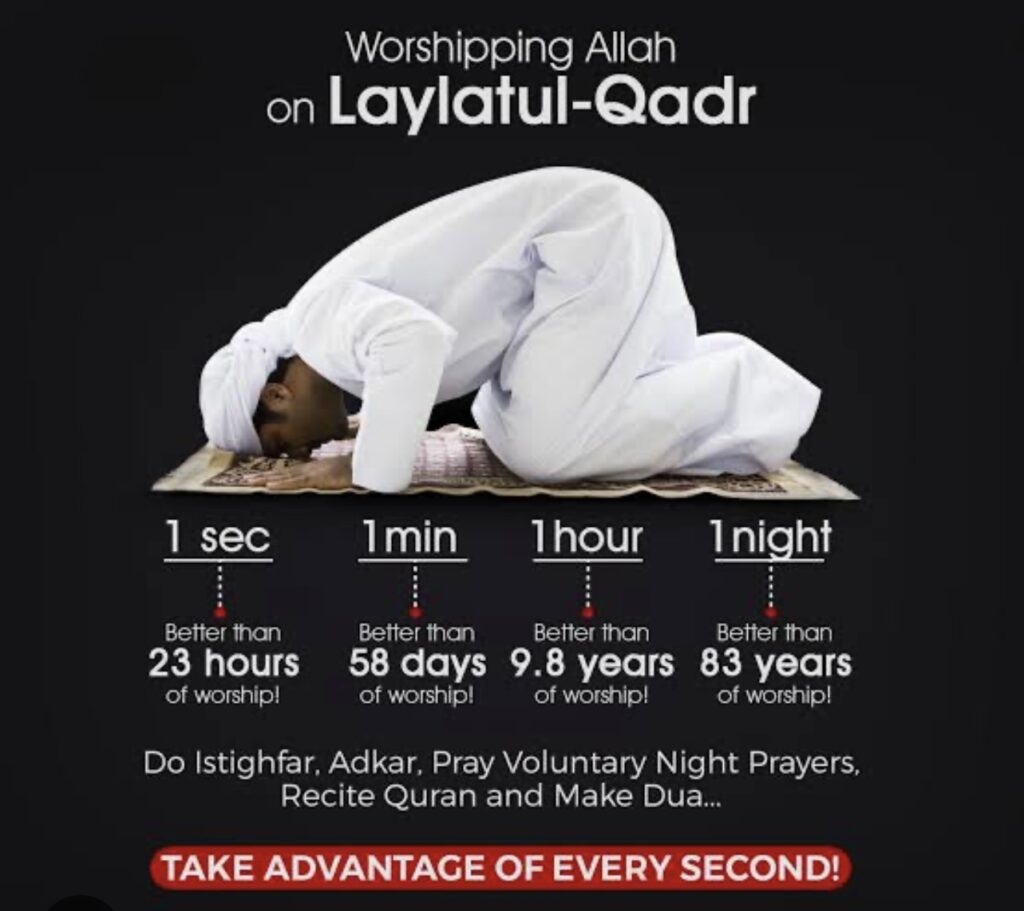
Receiving the Benefits of Lailatul Qadr
Perform as much Ibadah as possible, and spend that time either collectively or individually observing activities such as, recitation of the Quran, making Nafl prayers after Taraweeh, remembrance of Allah through dhikr, making supplication or Dua for ourselves and others, and pondering and contemplating the universe and the creation of the Heavens and the Earth
We can also read books of Hadith so as to enjoy the sayings of Prophet Muhammad (saw), read Tafseer of the Quran, give charity to others (if one has the means), and try to explain Islam (if one has some knowledge), to those near to us, so that they may benefit.
Itikaaf (retreat) is another form of Ibadah which is performed during the last ten days of Ramadan. It is spiritual seclusion in the masjid or an area of one’s home, where you can devote your nights and mornings in worship and recitation of Quran, for the pleasure of Allah (swt).
Inshallah, I pray that we all realize what a precious gift Lailatul Qadr is for us, and that we try our utmost to derive its benefit. May the last ten days of Ramadan be a very blessed time for you and your families, and may you receive reward in abundant measures, ameen.
Ammara Farooq By Alhamd Arabic Institute
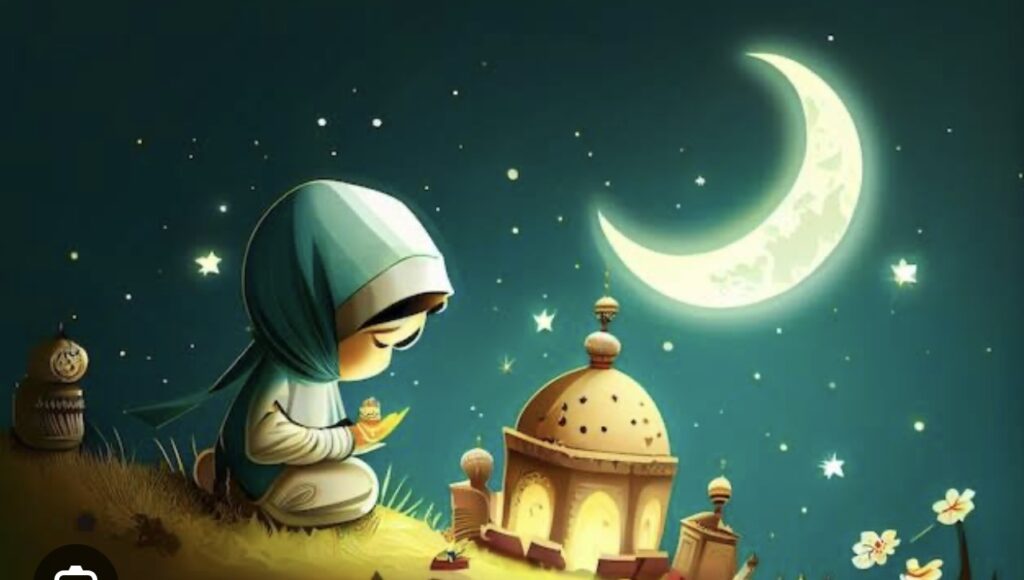


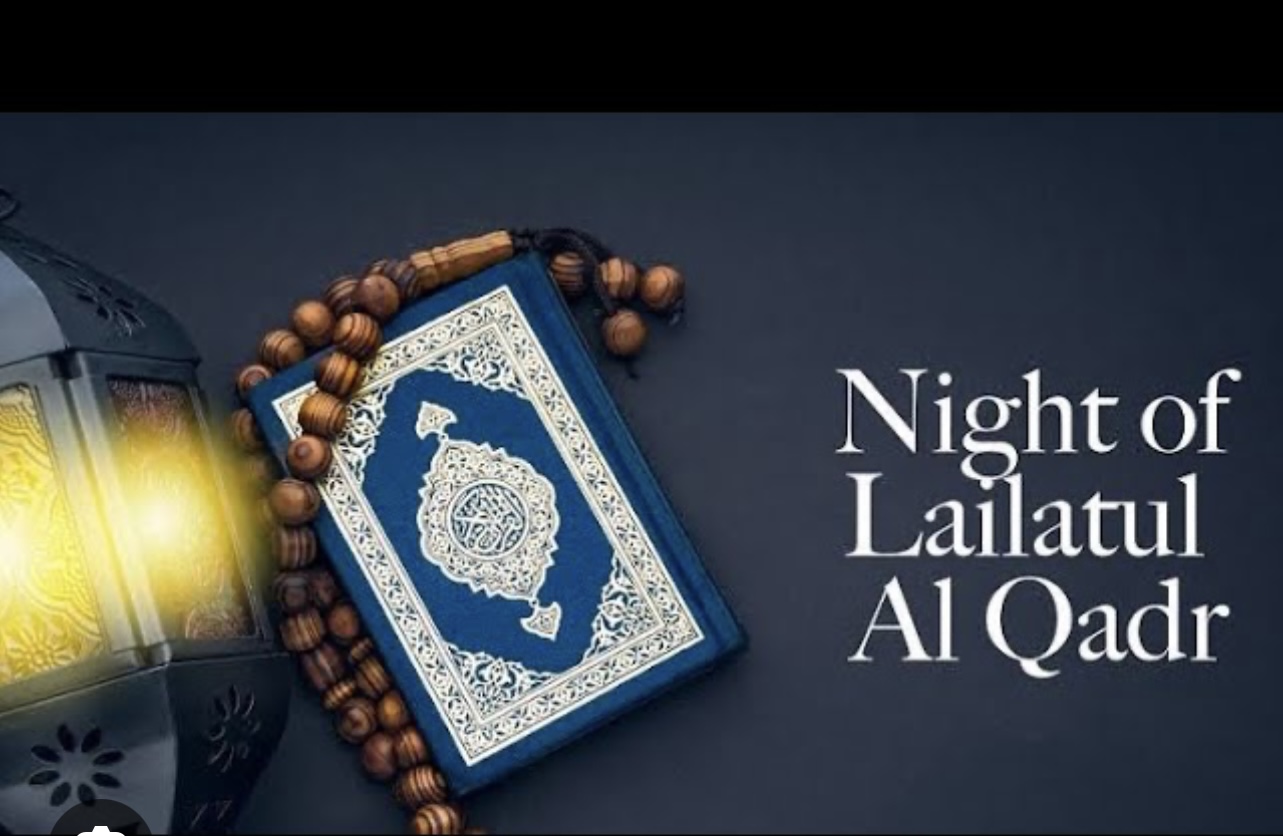
2 responses to “Lailat ul Qadr ( The night of power)”
Thank you for your sharing. I am worried that I lack creative ideas. It is your article that makes me full of hope. Thank you. But, I have a question, can you help me?
How ?